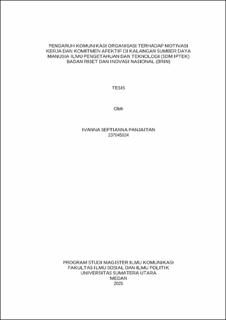Pengaruh Komunikasi Organisasi terhadap Motivasi Kerja dan Komitmen Afektif di Kalangan Sumber Daya Manusia Ilmu Pengetahuan dan Teknologi (SDM Iptek) Badan Riset Dan Inovasi Nasional (BRIN)
The Influence of Organizational Communication on Work Motivation and Affective Commitment Among Human Resources in Science and Technology (SDM IPTEK) at The National Research and Innovation Agency (BRIN)

Date
2025Author
Panjaitan, Ivanna Septianna
Advisor(s)
Kurniawati, Dewi
Nurbani
Metadata
Show full item recordAbstract
This study aims to examine how organizational communication affects work motivation and affective commitment, as well as to explore the relationship between work motivation and affective commitment among Human Resources in Science and Technology (SDM Iptek) within the National Research and Innovation Agency (BRIN). A quantitative approach was employed, with data collected through the distribution of questionnaires. Data analysis was conducted using correlation tests to assess the relationships among the variables under study. The aspect of organizational communication was analyzed based on five dimensions of Pace and Faules' theory, namely media quality, accessibility, information dissemination, message content, and accuracy. Work motivation was explained through a needs-based approach using Thangal's theory, while the concept of affective commitment referred to the framework developed by Meyer and Allen. The results indicate that organizational communication is closely related to both work motivation and employees affective commitment.
Furthermore, work motivation was found to have a very strong association with affective commitment. These findings confirm that effective organizational communication can enhance work motivation, which in turn strengthens employees' emotional attachment to the institution. Therefore, communication and motivation are considered essential elements in fostering employees' affective commitment. It is recommended that BRIN strengthen its internal communication systems to be not only informative but also responsive to employees' psychological needs. Human resource management strategies that emphasize effective communication and the fulfillment of emotional needs have the potential to create a productive, collaborative, and sustainable research work environment.
Collections
- Master Theses [362]
